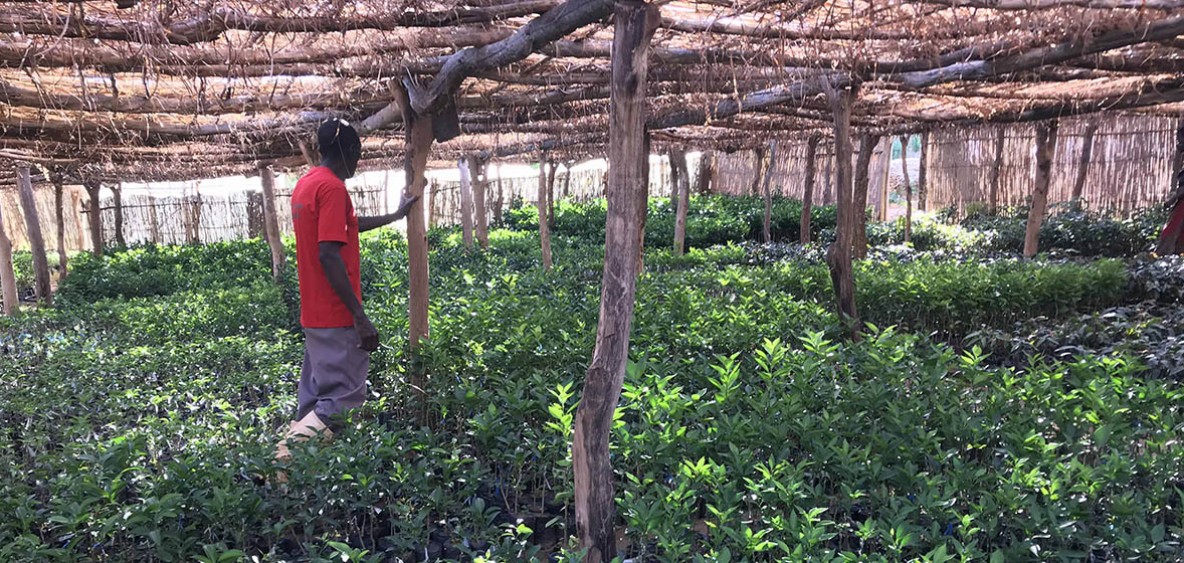
In October 2019, the RFS Regional Hub conducted a field visit to meet with community members and review the progress that’s been made in Sustainable Land Management and Integrated Catchment Area Management in Malawi.
The population of Malawi is currently 18.6 million—a number that is expected to double by 2040. Rapid population growth has placed increasing pressure on the country’s essential ecosystems services. This pressure is particularly felt in the country’s catchment areas where widespread soil erosion, caused by deforestation and unsustainable farming practices, threaten ecosystem health and food security. Because the vast majority of Malawians rely on the natural resources for their livelihoods, land degradation results in widespread loss of income and poverty.
To help the Government of Malawi minimise and reverse land and soil degradation in catchment areas, the Resilient Food Systems programme, together with IFAD, is applying an ecosystem-based approach to combat land degradation, improve food security, and increase resilience to climate change and extreme weather events. The RFS Malawi project, Enhancing the Resilience of Agro-ecological Systems (ERASP), is focused on catchment-level interventions in three districts, both in terms of improving integrated catchment area management and scaling-up sustainable land management practices within the catchment area.
In October 2019, RFS Task Manager, Jonky Tenou, travelled to Malawi to visit project sites and meet with community members to review the progress that’s been made in Sustainable Land Management and Integrated Catchment Area Management in Karonga, Rumphi, and Dwangwa.
While in Rumphi, Mr Tenou, accompanied by the RFS Malawi country project team, met a maize farmer who was a direct beneficiary of the Malawi Innovation Challenge Fund (MICF), a fund manged by UNDP and funded by multiple donors, including IFAD and DfID, that supports innovative and inclusive business projects in Malawi. The smallholder farmer spoke about the challenges that smallholder farmers in Malawi face:
First, the work is huge and the labour itself is limited. The second thing is marketing. We have problems in terms of marketing. The other thing is, when you grow crops in dry season, you have lots of pests and you need chemicals to at least control those things. Doing agribusiness, you cannot just start from nowhere, you need to have capital somewhere so that you can start to plan and say how do I do “A”, “B”, and “C”. So capital is another problem.

The RFS Malawi project is working to relieve some of these challenges for smallholder farmers by improving the institutional frameworks for managing natural resources within the communities. During the past year, the project has prioritised the sensitization, awareness raising, and training of local institutions, resulting in the capacitation of 172 Village Natural Resource Management Committees, Interim Water User Associations (WUAs) and Sub-Catchment Management Committees (CMCs) in catchment area management, land use planning and climate risk reduction. Following the capacity development phase, these local institutions developed 128 Village Level Action Plans (VLAPs) for each identified micro-catchment, which are currently being presented to Area Executive Committees and District Councils for approval. Once approved, the Catchment Management Committees will work with existing national and local institutions to implement the action plans.
The Village Natural Resource Management Committees have also been trained in various Sustainable Land Management (SLM) practices, including tree nurseries establishment, non-timber forest products and soil and water conservation techniques. These approaches and techniques are at the beginning stages of implementation, with significant progress being made in the selection of sites for woodlots, the operationalisation of community tree nurseries, and the establishment of agrobiodiversity demonstration plots.
Subscribe to our monthly newsletter to receive updates on stories directly from the field across all our projects, upcoming events, new resources, and more.